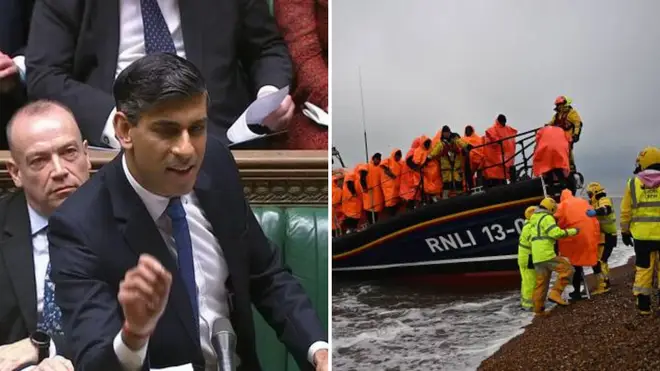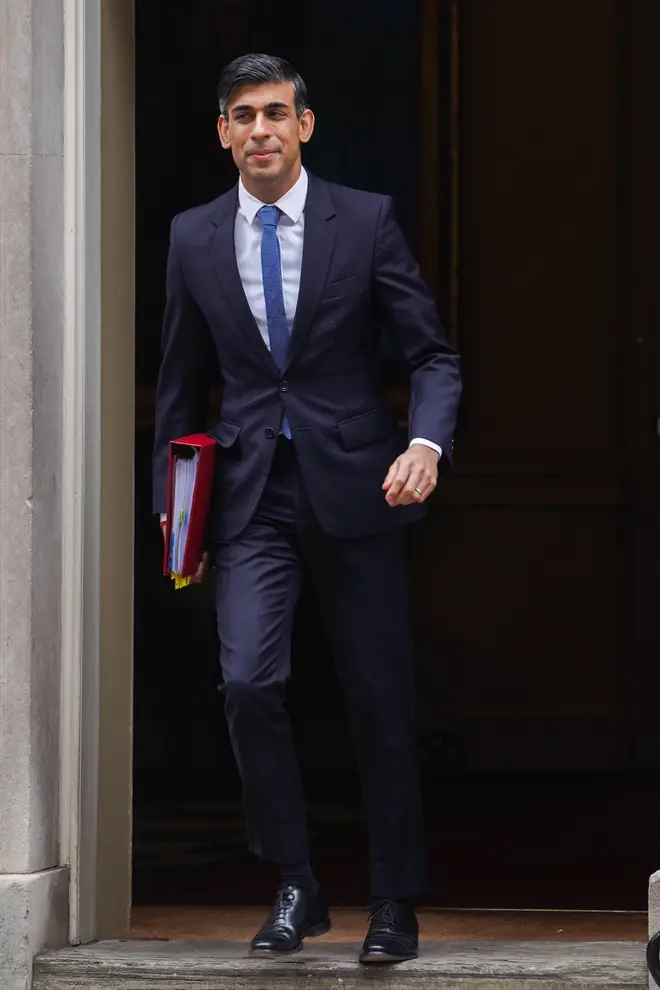
Shelagh Fogarty 1pm - 4pm
17 January 2024, 21:31 | Updated: 18 January 2024, 00:32

The government's Rwanda bill has passed its third reading, as Rishi Sunak saw off a rebellion that had been brewing on the Conservative back benches.
The Rwanda bill passed by 320 votes to 276, a majority of 44, as most former rebel MPs fell in line with the government.
Downing Street hailed the result as a "major step" in its plan to tackle illegal migration.
A total of 11 Conservative MPs voted against the bill - down significantly from the numbers who had gone against Mr Sunak's government on Tuesday's amendment votes.
The government "will be breathing a sigh of relief" after the vote went in ministers' favour, LBC's political editor Natasha Clark said on Wednesday evening.
The result means the bill has passed the House of Commons and will now go for debate in the House of Lords. Mr Sunak is set to make a speech on Thursday calling for the Lords not to amend the bill heavily.
Read more: Rwanda's president says there are 'limits for how long this can drag on'

Natasha Clark says government 'will be breathing a sigh of relief' as Rwanda bill passes third reading
The bill is expected to come up against significant opposition from some peers who could seek to water it down, although some Conservative members may try to add tougher amendments too. MPs will have to approve any changes when the bill returns to the Commons.
Legal migration minister Tom Pursglove said after the vote that the Lords should "get on and deal with it".
"It goes to Lords with a strong message from the elected house that we need action - people in the country want to see crossings across the Channel come to an end," he told the BBC. "This is a really important part of the jigsaw."
The eleven rebel MPs who voted against the bill were: Suella Braverman, Robert Jenrick, Miriam Cates, Danny Kruger, Sir William Cash, Sir Simon Clarke, Mark Francois, David Jones, Sarah Dines, Andrea Jenkyns and Sir James Duddridge.
That is a marked contrast with the 65 who voted in favour of an amendment to the bill earlier on Wednesday evening, after similar numbers voted for changes on Tuesday.
Downing Street said after the vote: "The passing of the bill tonight marks a major step in our plan to stop the boats.
"This is the toughest legislation ever introduced in Parliament to tackle illegal migration and will make clear that if you come here illegally you will not be able to stay.
"It is this government and the Conservative party who have got boat crossings down by more than a third.
"We have a plan, we have made progress and this landmark legislation will ensure we get flights off to Rwanda, deter people from making perilous journeys across the channel and stop the boats."
Home Secretary James Cleverly, speaking in the Commons ahead of the vote, said he respected the rebels who had backed amendments that they believed could strengthen the bill.
Mr Cleverly said the bill was "in complete compliance with international law" but would also stop legal challenges to deportation orders.
He said: "This bill sends an unambiguously clear message that if you enter the United Kingdom illegally you cannot stay.
"This bill has been meticulously drafted to end the merry-go-round of legal challenges."
The bill has come under fire publicly from the Tory rebels, including former immigration minister Robert Jenrick, who quit because he thought the plan would not work.
Conservative MP Bob Seely defended his party from accusations of in-fighting, and said that "intelligent critiquing of policy is no bad thing".
The Isle of Wight MP, who had earlier urged rebel colleagues to look for a new job if the bill failed, told LBC's Ben Kentish after the vote that "arguing and debating amongst politicians is a lot better than not arguing and not debating."
But opposition politicians hit out at the government after the bill was voted through. Labour's London mayor Sadiq Khan said that "the Rwanda policy has always been cruel, inhumane and unworkable, pursued by a weak government fixated on party interest rather than the national interest."
The Liberal Democrats said that the bill passing was "no victory for Rishi Sunak, no matter how he might try to twist it".
The party's Home Affairs spokesperson Alistair Carmichael said that Mr Sunak "has proved again and again that he cannot lead his own party, let alone the country".
Scotland's SNP First Minister Humza Yousaf branded the bill "the most repugnant piece of legislation in recent history".
He added that the result was "a further demonstration Westminster's values are not Scotland's values".

Wednesday night's vote had been expected to go the government's way after Tory MPs who had rebelled in votes on amendments on Tuesday signalled on Wednesday evening that they would back the bill.
The dozens of Conservatives who voted in favour of amendments toughening up the bill on Tuesday were concerned that voting the full legislation down could topple Rishi Sunak's government.
Natasha Clark said ahead of the vote that the rebellions on Tuesday's amendments represented a "really, really strong show of feeling".
But she added that "when push comes to shove, a lot of them today have just been telling me: 'Look, it's better to vote for this than nothing. It's the toughest stuff we've got so far.'"

LBC's political editor Natasha Clark says the Rwanda bill is expected to 'pass comfortably'
The Rwanda bill would stop British courts from blocking flights sending illegal arrivals to East Africa, after a previous version of the plan was stopped by the Supreme Court last year.
The government had feared Tory rebels, who want it toughened up so the European Court of Human Rights can't intervene, joining forces with opposition parties to block the bill.
The PM has insisted that the bill is robust enough to get flights off the ground. Nobody has been sent to East Africa as part of the plan yet.
MPs voted on amendments on Tuesday and Wednesday. An amendment proposed by Robert Jenrick on Wednesday that aimed to block last-minute interventions from European judges was voted down by 536 votes to 65, giving the government a majority of 471.


Ex-Justice Secretary Robert Buckland says there's a 'limit to how much Rwanda can tolerate'
Some in the Conservative party had raised fears that if the Rwanda bill failed it could spell the end for Rishi Sunak's government.
It comes after Mr Sunak endured the biggest rebellion of his 15-month premiership on Tuesday as dozens of Tory MPs backed two amendments designed to toughen up the Rwanda scheme in the Commons - against the government's wishes.
The resignations of deputy chairmen Lee Anderson and Brendan Clarke-Smith, as well as Jane Stevenson, a parliamentary private secretary to Kemi Badenoch, the business secretary, piled more pressure on Mr Sunak.
A total of 68 MPs - including 58 Conservatives - voted for an amendment to "disapply" international law to the scheme during Tuesday's vote - a bid to circumvent the European Court of Human Rights holding up deportation flights to Rwanda.
Then, ex-immigration minister Robert Jenrick's amendment to restrict individuals' abilities to make claims against deportation was defeated but 58 MPs voted for it.